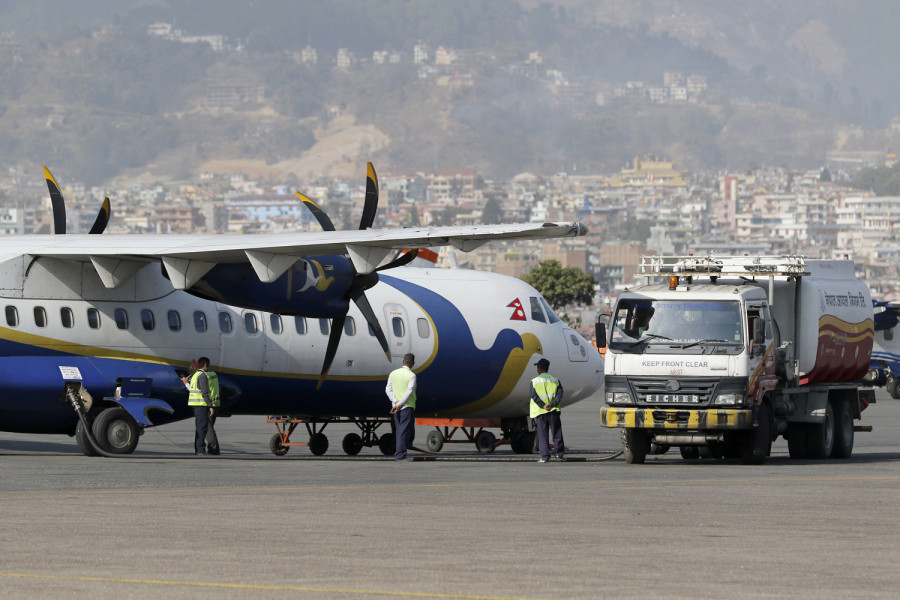National
Nepal Oil slashes jet fuel price by 20 percent
Fuel is the largest operating expense for airlines, accounting for as much as one-third of total costs. A 20 percent drop in fuel price, according to airlines, may see a roughly 10 percent drop in ticket prices.
Sangam Prasain
Nepal’s state-run oil supplier has slashed the aviation turbine fuel price by a steep 20 percent in a move that could come as a much needed respite for international airlines.
The decision comes amid complaints that the airlines were facing financial pain because of lost revenue in the face of Covid-19 pandemic.
With the ATF price slashed, airfares are also likely to come down, which will be a big respite for Nepalis, particularly migrant workers, who were forced to pay a hefty amount of money for tickets to the airlines operating to and from Nepal.
Binitmani Upadhyaya, spokesperson for Nepal Oil Corporation, said the board of directors of the state-owned oil company on Sunday decided to slash the jet fuel sold for international airlines.
“The new price is $715 per kilolitre from $893 per kilolitre,” Upadhyaya told the Post.
This is the first time Nepal’s oil monopoly has made a sharp down revision in jet fuel reducing the price by $178 per kilolitre–a 20 percent reduction.
The new rates came into effect on Monday.
“There were complaints that the oil corporation was selling jet fuel at a higher rate even during the pandemic,” said Upadhyaya. “So the government decided to reduce the price. This is a temporary arrangement though.”
With the reduction, the jet fuel price in Nepal, said to be the world's most expensive, has now dropped near to that of Kolkata in India.
According to Indian Oil, jet fuel price, based on June 1 rate, is $666.62 per kilolitre in New Delhi, $703.73 per kilolitre in Kolkata and $657 per kilolitre in Mumbai.
Nepal Oil Corporation said in its press statement that it has been enjoying as high as 70 percent profit in jet fuel sold to the international airlines in order to cross-subsidize the liquified petroleum gas or cooking gas.
“Now, the board has passed a policy not to take more than 15 percent of profit during the period of crisis caused by Covid-19 pandemic,” said Upadhyaya.
Whether Nepal Oil will adopt an auto pricing mechanism for jet fuel in the post-pandemic period will be decided by the board, according to him.
Currently, the corporation follows an auto pricing system on other fuel products except for aviation turbine fuel and cooking gas.
Vijay Shrestha, vice president, Administration of Himalaya Airlines, welcomed Nepal Oil’s recent decision.
“There’s no doubt that the reduction in the oil price is a relief for airlines as well as passengers,” Shrestha told the Post.
International passenger markets remained weak due to the ongoing border restrictions, particularly in Nepal, exacerbated by the uneven progress in vaccination rollouts and the resurgence in Covid-19 transmissions.
According to Shrestha, international airlines had been requesting the government to determine the jet fuel price on par with neighbouring countries for a long time.
“We have been demanding an auto pricing mechanism in jet fuel price to make the market competitive,” he said. “There should be a reasonable profit margin for Nepal Oil Corporation.”
Fuel is the largest operating expense for airlines, accounting in recent years for as much as one-third of total costs. According to Shrestha, a 20 percent drop in fuel price may see a roughly 10 percent drop in ticket prices.
Nepal’s civil aviation body has allowed limited passenger flights to and from key international gateways like Turkey, Qatar, China and India.
The announcement, as per a Cabinet decision, has fixed the days of weekly flights to these destinations. Earlier only chartered flights were allowed and they were allegedly charging exorbitant fares.
After the second wave hit the country, the government had banned all international flights, except two a week between Kathmandu and New Delhi, from May 6 midnight.




 20.12°C Kathmandu
20.12°C Kathmandu















